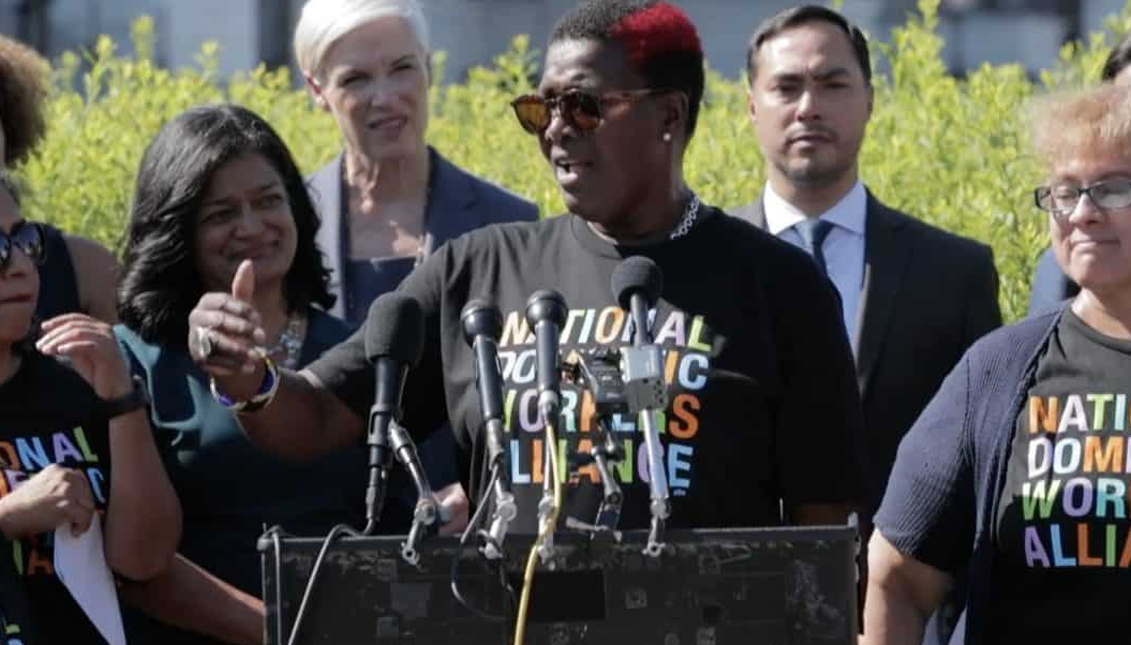
The Significance of reintroducing the National Domestic Workers Bill of Rights
After achieving some local and statewide victories, the National Domestic Workers Alliance continues to fight for federal protections.
Throughout the COVID-19 pandemic, domestic workers have risked their lives to keep others safe throughout these uncertain times.
House cleaners sanitize homes so families can feel more protected against the virus, while those who work in elderly care are the first line of defense for the pandemic’s most vulnerable population.
As people return to their physical work settings, parents are also relying on nannies once again to watch over their children.
Despite all the work people in the industry do and for as long as the type of work has existed, domestic workers have been left out of basic labor protections in America.
They were excluded from the 1938 Fair Labor Standards Act because Southern members of Congress were unwilling to support it if it included protections for domestic and agriculture workers, who were mainly African-American at the time.
As a result, their exemption today is a lasting effect of slavery in the United States.
Of the estimated 2.2 million workers, many of them are women of color and immigrants.
Many are afraid to speak up about injustice and abuse they may have faced from their employers because of a dynamic that makes them feel vulnerable or inferior, and some simply may not be aware of their rights.
That is why congresswoman Pramila Jayapal (D-WA) reintroduced the Domestic Workers Bill of Rights on July 29 with two cosponsors in the Senate, Kirsten Gillibrand (D-NY) and Ben Ray Lujan (D-NM).
She introduced the bill in 2019 alongside then-Senator Kamala Harris.
The bill sought to repeal the exemption from the 1938 act, establishing standard written agreements and allowing domestic workers to have retirement benefits among so much more.
Its passage two years ago was always going to be a difficult road with Republicans controlling the Senate and the White House with the bill’s main promoters as liberal or progressive Democrats.
Now that Democrats have control of the upper chamber and Joe Biden won the 2020 presidential election, there is hope for it to become law and put an end to the laboral discrimination.
Having the former cosponsor of the bill in the Senate, Harris, as vice president now also gives domestic workers more hope because their advocate has risen to a higher position of power.
“All of society benefits from domestic workers and caregivers and the work they do every day. They shouldn’t be excluded from the protections and benefits other workers receive, such as paid sick leave, child care relief, and hazard pay,” she wrote on Facebook last year.
RELATED CONTENT
Maria del Carmen Diaz, a 2021 AL DÍA Woman of Merit and leading member of the Pennsylvania Domestic Workers Alliance, was in Washington D.C. in 2019 when the act was first introduced.
She fought to have the City of Philadelphia pass its own Domestic Workers Bill of Rights. The vote in City Council was unanimous and the law went into effect May 2020.
The activist, who has been a house cleaner in the Philadelphia area for over 20 years, met with Rep. Jayapal, Sen. Harris and other legislators to discuss how both her and people in her field would feel liberated by the act’s passage.
“If this reintroduction is successful we are going to be valued and respected. It's time to have these changes because we are in the 21st century and this work is just as worthy of right as any other,” Diaz told AL DIA News.
She appreciates the support for the bill from the vice president, but hopes she can make good on word from when Harris was in the Senate.
“This is a commitment that she made to my face when I met with her and we asked that she deliver so that it does not end with words and unkept promises,” Diaz said.
The Biden administration still has another way in which they improve the labor standards for many domestic workers and it is through the Democrat’s recently finalized budget resolution for the upcoming fiscal year.
Within the resolution, the Committee on Health, Education, Labor, and Pensions received an instruction of $726 billion, which includes massive investments in child and home care.
Another component of the budget proposal is providing a pathway to citizenship for millions of immigrant workers and families. This would go a long way to making many domestic workers feel comfortable reporting their employers over abuses they may experience.
Democrats have manners of addressing inequities in the field of domestic work and with the votes they have in both chambers of Congress, there is no reason to continue to make them feel like second-class workers.
“It is hard to continue to ignore us if we work in the most intimate part of your life, your own home,” Diaz said.











LEAVE A COMMENT:
Join the discussion! Leave a comment.